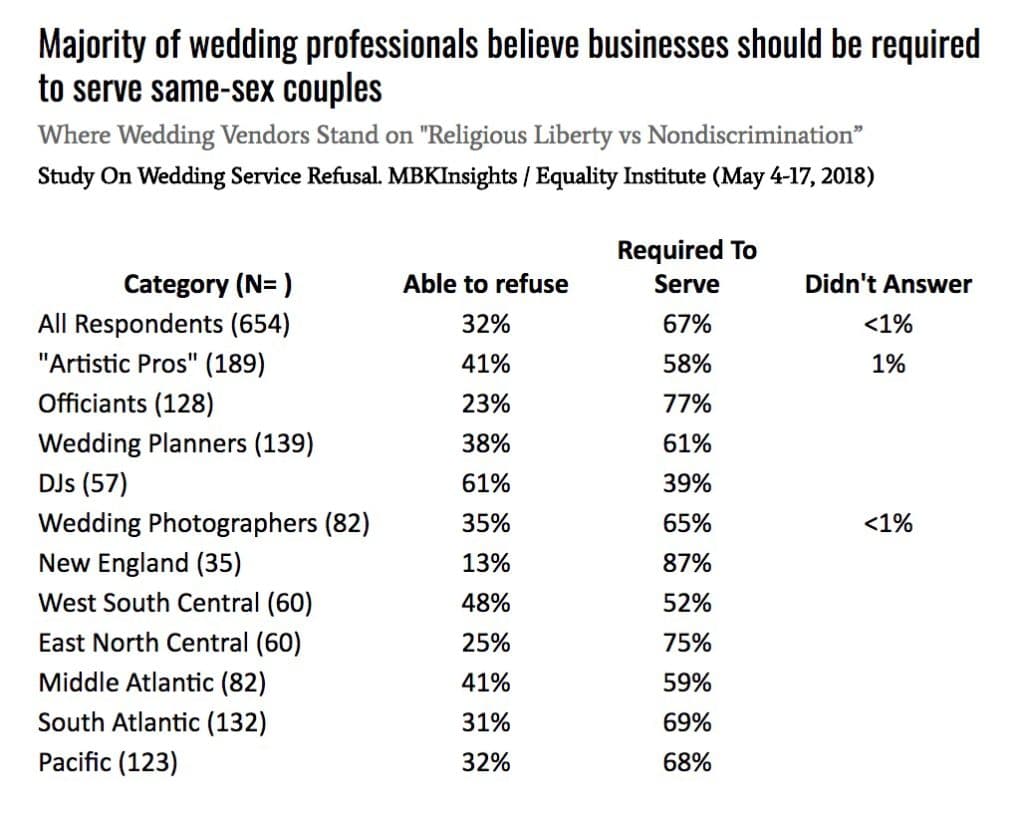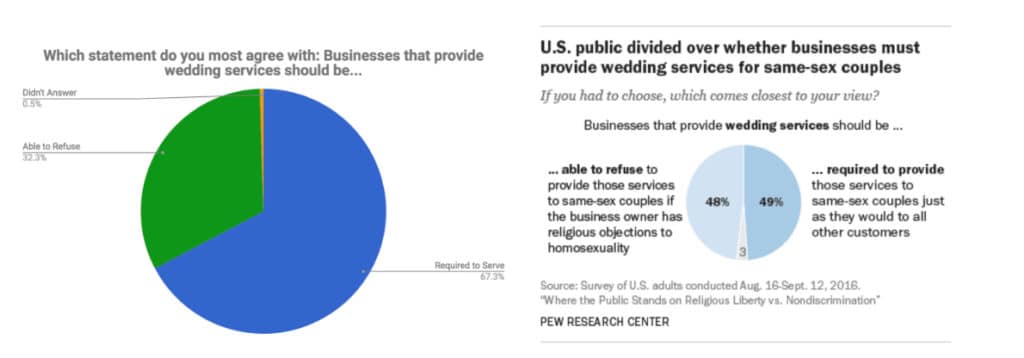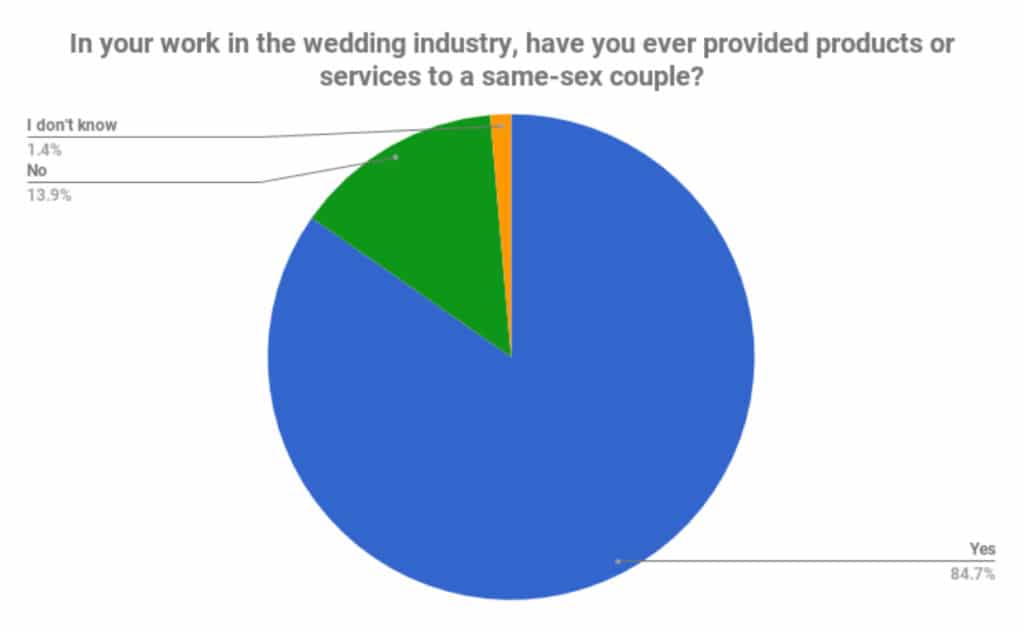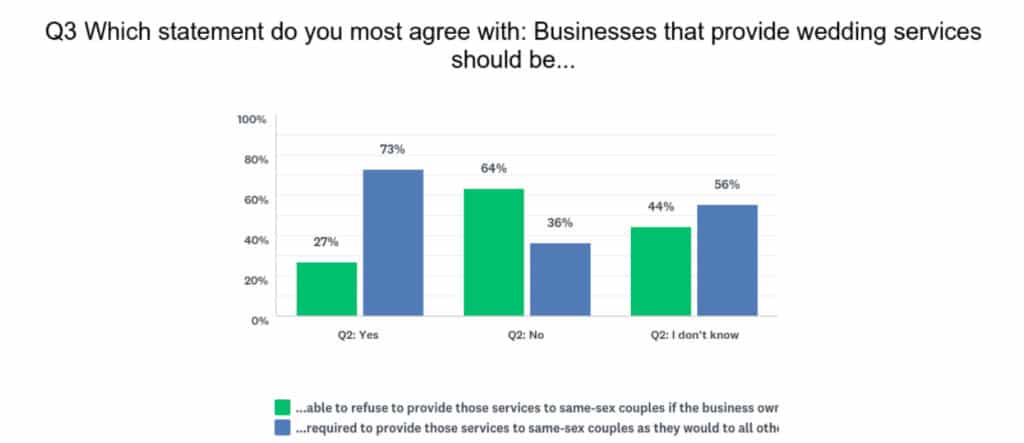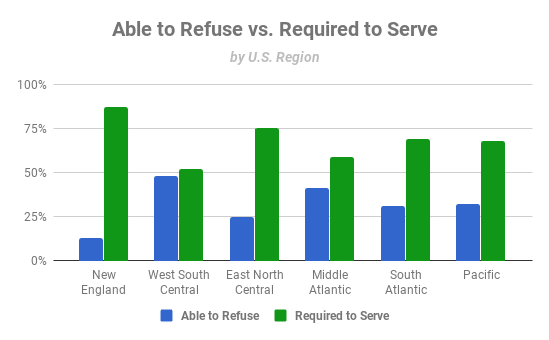In 2014, and again in 2016, the Pew Research Center found that an almost equal split of Americans believed that wedding-related businesses should be required to serve same-sex couples (49%) as should be allowed to refuse services for religious reasons (48%). A valuable finding, but one that does not provide key insight into what wedding professionals–the group of small business owners most directly impacted by this question–think about the question of religious liberty vs. nondiscrimination*.
Although the Supreme Court may have settled the question of marriage equality in 2015, it, like the wedding industry itself, did not resolve the simmering debate about whether or not wedding professionals should be compelled to serve same-sex couples if they oppose same-sex marriage. With the Masterpiece Cakeshop v. the Colorado Civil Rights Commission decision pending at the Supreme Court, this study asked wedding professionals to weigh in on the question the Pew Research Center asked: “Should wedding-related businesses be able to refuse to provide services to same-sex couples based on religious objections or required to provide those services to same-sex couples as they would all other couples?”
Summary of Study On Wedding Service Refusal
- A majority of wedding professionals (67%) believe that wedding-related businesses should be required to serve same-sex couples; a minority of vendors (32%) support service refusal.
- Wedding professionals (67%) are much more likely than the general population (49%) to believe wedding-related businesses should be required to serve same-sex couples.
- Eighty-five percent (85%) of wedding professionals report that they have provided products or services to a same-sex couple. Only 14 percent of respondents say that they have never done so, and 1 percent aren’t sure.
- Wedding professionals who have provided services or products to a same-sex couple are more likely to support the requirement that wedding-related business serve same-sex couples as they would all other couples. Conversely, wedding professionals who have not provided services or products to same-sex couples are more likely to say that businesses should be able to refuse services.
- Officiants, wedding planners and photographers/videographers are more likely to support the requirement to serve than the opportunity to refuse to serve same-sex couples. DJs are more likely to believe that wedding-related businesses should be able to refuse service.
- Wedding businesses based in New England (ME, NH, VT, MA, RI, CT) overwhelmingly support the requirement to serve (87%). Those based in West South Central US (TX, OK, LA, AR) are most closely split, with a slim majority supporting the requirement to serve (52%).
- A majority (58%) of wedding-related services that involve some artistry (photography/videography; florists; lighting/decor designers; invitations; DJs; ceremony music; bands; and wedding cakes) support the requirement to serve same-sex couples.
- One third of all respondents opted to leave an open-ended comment. Of those, 21 percent reinforced their opinion in favor of service refusal and 40 percent reinforced their opinion in favor of a requirement to serve all couples. Notably, the 25 percent of those respondents commented that, though they support the right to refuse to serve a same-sex couple, they also think same-sex couples should be served.
Results
A majority of wedding professionals (67%) believe that wedding-related businesses should be required to serve same-sex couples; only 32% support service refusal.
Roughly 7 in 10 wedding professionals (67%) believe that “businesses that provide wedding services should be required to provide those services to same-sex couples as they would any other couple.” This result (determined by a larger sample size, N=654) is slightly higher than the result of 64 percent of wedding professionals favoring a service requirement in the fall of 2017 (Survey of Wedding-Related Representation, N=197). Only 3 in 10 wedding professionals (32%) responded that they believe that businesses that provide wedding services “should be able to refuse to provide those services to same-sex couples if the business owner has religious objections.”
Wedding professionals (67%) are much more likely than the general population (49%) to believe wedding-related businesses should be required to serve same-sex couples.
Wedding professionals (67%) who responded in this survey are much more inclined than the general population surveyed by the Pew Research Center in 2016 (49%) to say that businesses that provide wedding services should not required to provide services to same-sex couples as they would to any other couple. Conversely, a minority of wedding pros (32%) believe that businesses that provide wedding services “should be able to refuse to provide those services to same-sex couples if the business owner has religious objections,” whereas almost half of the general population (48%) supported service refusal.
Eighty-five percent (85%) of wedding professionals report that they have provided products or services to a same-sex couple. Only 14% of respondents say that they have never done so, and 1% aren’t sure.
The vast majority of respondents (85%) report having worked with at least one same-sex couple. Fewer than 2 percent are unsure, most likely because they offer a product for which they do not interact directly with their clients or do not necessarily know the gender of the partner of the client. Examples might include stationers who create a shower invitation, a florist who offers a set of boutonnieres, a pastry chef who provides a wedding cake or desserts through a caterer, an event equipment rental company who provides tables and chairs, etc.
Wedding professionals who have provided services or products to a same-sex couple are more likely to support the requirement that wedding-related business serve same-sex couples as they would all other couples.
Direct experience and interpersonal relationship continues to suggest an increase in understanding and support. Wedding professionals who have not worked with a same-sex couple (whether it is by choice or circumstance is unclear) are more likely to say that they believe a business should be able to refuse service to a same-sex couple if the business owner has a religious objection (64%) than to agree that business should be required to serve a same-sex couple (36%). Those who have provided a service to a same-sex couple (73%), however, are more likely to support the requirement that a wedding-related business be required to serve same-sex couples. Those who were unsure about having served a same-sex couple in the past were closely split on the question.
Officiants, wedding planners and photographers/videographers are more likely to support the requirement to serve than the opportunity to refuse to serve same-sex couples. DJs are more likely to believe that wedding-related businesses should be able to refuse service.
Officiants (77%), wedding planners (61%) and wedding photographers (65%) are the professionals most likely to be most intimately involved with the couple during the planning and ‘day of’ service process. And, a majority of respondents from each of these categories indicated that they support the requirement that businesses serve same-sex couples.
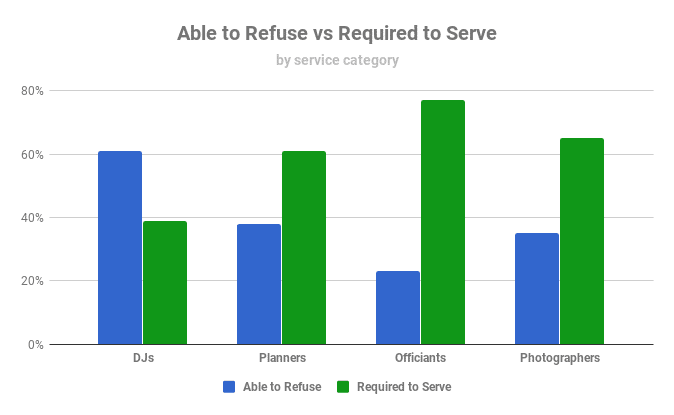
Wedding businesses based in New England (ME, NH, VT, MA, RI, CT) overwhelmingly support equal access to service (87%), and those based in West South Central US (TX, OK, LA, AR) are most closely split, with a slim majority supporting the requirement to serve (52%).
In the Survey of Wedding-Related Representation (2017), respondents from New England were the strongest supporters of the notion that business should be required to serve same-sex couples. Although the sample size for New England in this survey was relatively small (N=35), the trend appears to be holding in this study as well. Similarly, respondents from West South Central also offer a consistent value judgment across studies; in 2017, 49 percent said that they did not support service refusal and, in this study, 52 percent say that they support a requirement to serve. (Note: the Survey of Wedding-Related Representation and the current survey offered variations on the question of service refusal thus the inconsistency in the framing language.)
A majority (58%) of wedding-related services that involve some “artistry” support the requirement to serve same-sex couples.
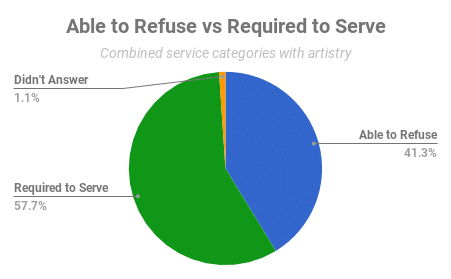
Even with the categories stacked with those who perform artistic services (N=189), the majority of vendors from this group (58%) responded that they believe that businesses should be required to serve same-sex couples as they would all other couples. Forty-one percent (41%) felt that businesses should be able to refuse to serve same-sex couples based on religious objection and 1 percent skipped the question.
One third of all respondents opted to leave an open-ended comment. Of those, 1 in 5 reinforced their opinion in favor of service refusal and 2 in 5 reinforced their opinion in favor of a requirement to serve all couples.
This survey was constructed to ask respondents to “choose a side” on a question that is complicated for many; especially for wedding professionals who, as a group, tend to appreciate having wide latitude to book business with clients with whom they feel they are a creative and efficient match. Even so, wedding professionals seem to have increasing clarity on their feelings around service refusal when it comes to religious objections and serving same-sex couples.
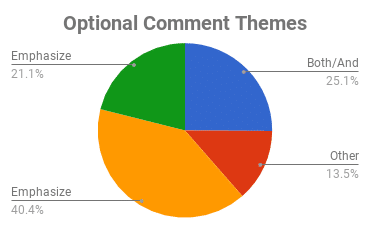
-
- Those who reinforced their opinion in favor of a requirement to serve (40%)
- Those who reinforced their opinion in favor of the ability to refuse to serve (21%)
- Those who revealed that they both supported the ability to refuse to serve, and also think that same-sex couples shouldn’t be denied service (25%)
- Other (14%)
Examples of statements wedding vendors who restated their support for a requirement to serve are:
- “I believe that if you serve the public, you serve the public. There is no grey area.”
- “Wedding vendors should AT LEAST be compelled to comply with their state laws regarding discrimination.”
- “If your business is ‘open to the public,’ you do not get to discriminate against that public. Offer your services in a buying club or through your religious affiliation if you want to pick and choose who you serve.”
- “I don’t think we should be allowed to refuse service based off of race, religion, gender, sexual identity, or sexual preferences. Refusing a same sex couple is akin to refusing a Muslim couple or a black couple and that’s not ok.”
Examples of statements wedding vendors who restated their support for the ability to refuse service are:
- “Although I personally do not believe in same sex marriage, all people have the right to make their own choice. If a business does not want to do business with ‘any person’ this is their right.”
- “As a business owner, you should be allowed to choose what you sell and to whom you sell it.”
A quarter of those who opted to comment explained that they support a right to refuse service due to religious belief, but also say that they do not agree with discrimination against same-sex couples.
Wedding professionals, many of whom work long hours in a very competitive industry, tend to appreciate having wide latitude to book business with clients with whom they feel they are a “good match.” These same wedding professionals tend also to be open-minded and more concerned with the bottom-line than judging others. Thus, there is a segment of respondents who gravitate to a “both/and” approach to the question of service refusal.
The Survey of Wedding Representation offers more detail into this nuance, but the theme also emerged in the optional comments of this study. A quarter of those who opted to comment (25%) say that they both support a right to refuse service due to religious belief, and also think that same-sex couples shouldn’t be discriminated against.
Examples of statements from wedding vendors who approached the question as a both/and proposition include:
- “While I personally would not refuse services to any group, I do believe that a small business owner has the right to refuse service based on their own beliefs.”
- “As a business owner, I should be able to refuse services to ANY customer who walks in my door. Would I personally deny service to a same sex couple, NEVER!”
- “I have yet to provide wedding services for a same-sex couple. I look forward to the opportunity to do so. However, I don’t think a business should be ‘forced’ to do business with same-sex couples if they are uncomfortable with doing so. I think this creates an animosity that ultimately reduces the level of service the customer should receive when dealing with wedding vendors.”
- “Although we are a gay-owned company we support freedom however misguided it may be.”
- “We should have the right to choose. Not every couple is the right fit for us, gay or straight, black or white it doesn’t matter to me, but I want the right to decide myself who I will be a good fit for in my creative process.”
- “I don’t condone bigotry, but I believe in religious freedom.”
- “That business has the right to refuse service, but the couple has a right to share their experiences and hopefully the market will no longer support people who refuse service. I think it’s shameful to exclude any couple and I hope the time comes when the rest of us run the bigots out of business.”
Conclusions
The question of wedding-related service refusal was not settled by the wedding industry or the courts with the advent of marriage equality in 2015. If anything, debate became more heated through media reports of vocal opponents on both sides of the question. Meanwhile, the wedding industry and the majority of the general population have quietly come to expect that same-sex couples can and should be served when it comes to wedding planning.
In fact, this study found that a majority of wedding professionals (67%) believe that businesses should be required to serve same-sex couples as they would all other couples. Further, even those who may have voted in this survey for the ability to refuse to serve a same-sex couples based on a religious objection, also show support for a non-discriminatory environment for same-sex couples.
Because this survey was limited to six questions and 14 days of online recruitment, there are some limits to the conclusions that can be drawn. Based on the survey construction, there is not enough information to reveal differences in response by individual state, gender, religious affiliation, political party or race. A larger sample of respondents in each service category might also have provided additional insights.
Even with those limitations, however, an enlightening conclusion can be drawn from this study. Wedding professionals–the group of small business owners most directly impacted by the question of service refusal–feel much more strongly than the general public about service refusal. Given its collective druthers, the wedding industry prefers that businesses that offer wedding-related services be required to serve same-sex couples as they would all other couples.
Methodology
This MBKinsights / Equality Institute survey was conducted online via SurveyMonkey from May 4 – 17, 2018 among a national sample of wedding professionals through social media and industry association recruitment. Respondents (N= 654) represent more than 20 major categories of wedding service offerings from nine U.S. regions representing all 50 states. The survey, which consisted of six questions, was developed to mirror the structure of the question of “religious liberty vs. nondiscrimination” on the Pew Research Center’s report in order to provide a comparison of opinions of U.S.-based wedding vendors to the general population of adults in the United States. All questions required a response, with the exception of an optional comment box (Q6) and the central question (Q3) — “Should wedding-related businesses be able to refuse to provide services to same-sex couples based on religious objections or required to provide those services to same-sex couples as they would all other couples?”
For the full report, including background research, please download the 2018 Study of Wedding Service Refusal [PDF].
For more information on this report, please contact Kathryn Hamm or Bernadette Smith.
* Phrasing “Religious Liberty vs Nondiscrimination” references the Pew Research Center’s Survey of U.S. Adults (Aug 16 – Sept 12, 2016), Where The Public Stands on Religious Liberty vs Nondiscrimination.
About MBKinsights

About Equality Institute



